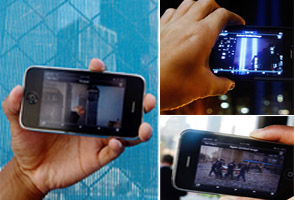If an aircraft enthusiast monitors position broadcasts from passing flights and records the identifiers and positions of those planes, is it a threat to security? Most would say no, the information is already being broadcast. What about if he publishes that information on a website? Well, now it’s easier for anyone to use that information – but it’s the same information.
Now, an app, PlaneFinder, has been released for the Android and iPhone which makes that same information even more usable – you can now point your phone at the sky and get a live readout of the flight number, speed, destination and route of that otherwise unknown dot in the sky – a pretty powerful tool for plane-spotters and the public.
US authorities including the Federal Aviation Authority and the Department of Homeland Security are concerned that this could be used by terrorists and are investigating the matter. The Daily Mail and other tabloids are concocting horror stories of how the app could be used to target surface-to-air missiles. There are reports that “security experts” have deemed the app “an aid to terrorists”.
Clearly, there is some fear-mongering here, as with any story that can be linked to terrorists – but the pattern is one that is repeating more and more. Using new technology, people are harvesting publicly accessible data, making it usable in new ways, in new situations – and shifting the balance of power from the establishment to the individual. And the establishment doesn’t like that. Should tools that offer such access be banned, as the tabloids suggest? Or would that just deny the public access to a useful tool – and make little difference to the determined wrong-doer?






 @
@
 Tags:
Tags: 


 Like all images on the site, the topic icons are based on images used under Creative Commons or in the public domain. Originals can be found from the following links. Thanks to
Like all images on the site, the topic icons are based on images used under Creative Commons or in the public domain. Originals can be found from the following links. Thanks to